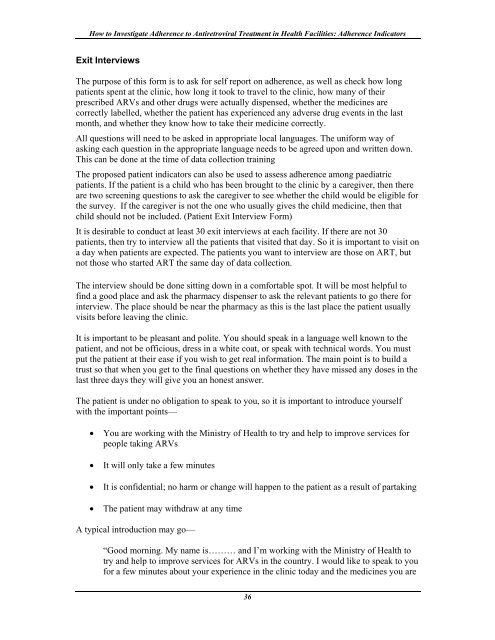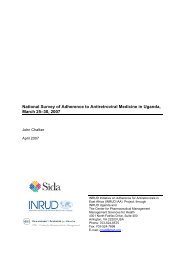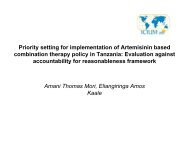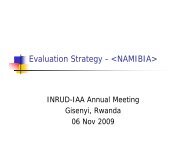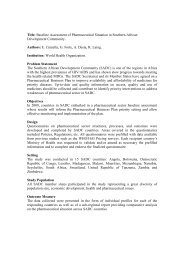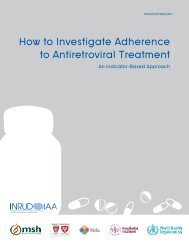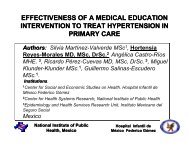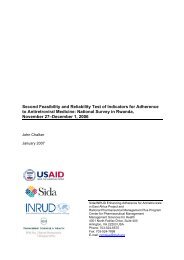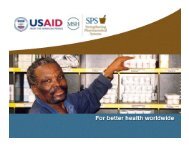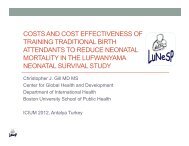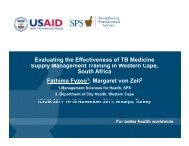How to investigate Adherence to Antiretroviral Treatment ... - INRUD
How to investigate Adherence to Antiretroviral Treatment ... - INRUD
How to investigate Adherence to Antiretroviral Treatment ... - INRUD
Create successful ePaper yourself
Turn your PDF publications into a flip-book with our unique Google optimized e-Paper software.
<strong>How</strong> <strong>to</strong> Investigate <strong>Adherence</strong> <strong>to</strong> <strong>Antiretroviral</strong> <strong>Treatment</strong> in Health Facilities: <strong>Adherence</strong> Indica<strong>to</strong>rs<br />
Exit Interviews<br />
The purpose of this form is <strong>to</strong> ask for self report on adherence, as well as check how long<br />
patients spent at the clinic, how long it <strong>to</strong>ok <strong>to</strong> travel <strong>to</strong> the clinic, how many of their<br />
prescribed ARVs and other drugs were actually dispensed, whether the medicines are<br />
correctly labelled, whether the patient has experienced any adverse drug events in the last<br />
month, and whether they know how <strong>to</strong> take their medicine correctly.<br />
All questions will need <strong>to</strong> be asked in appropriate local languages. The uniform way of<br />
asking each question in the appropriate language needs <strong>to</strong> be agreed upon and written down.<br />
This can be done at the time of data collection training<br />
The proposed patient indica<strong>to</strong>rs can also be used <strong>to</strong> assess adherence among paediatric<br />
patients. If the patient is a child who has been brought <strong>to</strong> the clinic by a caregiver, then there<br />
are two screening questions <strong>to</strong> ask the caregiver <strong>to</strong> see whether the child would be eligible for<br />
the survey. If the caregiver is not the one who usually gives the child medicine, then that<br />
child should not be included. (Patient Exit Interview Form)<br />
It is desirable <strong>to</strong> conduct at least 30 exit interviews at each facility. If there are not 30<br />
patients, then try <strong>to</strong> interview all the patients that visited that day. So it is important <strong>to</strong> visit on<br />
a day when patients are expected. The patients you want <strong>to</strong> interview are those on ART, but<br />
not those who started ART the same day of data collection.<br />
The interview should be done sitting down in a comfortable spot. It will be most helpful <strong>to</strong><br />
find a good place and ask the pharmacy dispenser <strong>to</strong> ask the relevant patients <strong>to</strong> go there for<br />
interview. The place should be near the pharmacy as this is the last place the patient usually<br />
visits before leaving the clinic.<br />
It is important <strong>to</strong> be pleasant and polite. You should speak in a language well known <strong>to</strong> the<br />
patient, and not be officious, dress in a white coat, or speak with technical words. You must<br />
put the patient at their ease if you wish <strong>to</strong> get real information. The main point is <strong>to</strong> build a<br />
trust so that when you get <strong>to</strong> the final questions on whether they have missed any doses in the<br />
last three days they will give you an honest answer.<br />
The patient is under no obligation <strong>to</strong> speak <strong>to</strong> you, so it is important <strong>to</strong> introduce yourself<br />
with the important points—<br />
• You are working with the Ministry of Health <strong>to</strong> try and help <strong>to</strong> improve services for<br />
people taking ARVs<br />
• It will only take a few minutes<br />
• It is confidential; no harm or change will happen <strong>to</strong> the patient as a result of partaking<br />
• The patient may withdraw at any time<br />
A typical introduction may go—<br />
“Good morning. My name is……… and I’m working with the Ministry of Health <strong>to</strong><br />
try and help <strong>to</strong> improve services for ARVs in the country. I would like <strong>to</strong> speak <strong>to</strong> you<br />
for a few minutes about your experience in the clinic <strong>to</strong>day and the medicines you are<br />
36


